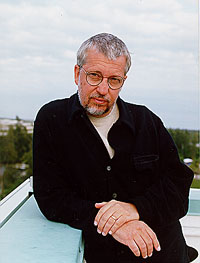
|
D
A N
S
I M M O N S : Hyperion Revealed (excerpted from Locus Magazine, May 1997) | |||
 Photo by Beth Gwinn other interview excerpts |
Dan Simmons's first published short story, "The River Styx Runs Upstream", won Twilight Zone magazine's first story contest in 1982. His first novel, Song of Kali (1985) was horror, and won the 1986 World Fantasy Award; Carrion Comfort (1989) won the 1990 Bram Stoker Award. Also in 1989 was Hyperion, winner of the 1990 Hugo for Best SF Novel; both it and its sequel The Fall of Hyperion won Locus Awards. Several horror novels followed, including Fires of Eden (1994), winner of the 1995 Locus Award for Best Horror Novel. He returned to the Hyperion universe with Endymion (1996) and the forthcoming conclusion of the cycle, The Rise of Endymion, scheduled for this September. "The Rise of Endymion is absolutely the last of the 'Hyperion' books. It's not the last thing I'll ever write in that universe -- there's a novelette I need to write -- but it is the last novel..." "Sometimes it's a dirty trick when a writer continues a tale and you find out that there were unreliable narrators, or something that seemed to be told in all candor actually wasn't as it appeared. That irritates me sometimes when I read, but I did that in The Fall of Hyperion -- some of the things in Hyperion were not as first perceived. And I have to say, in The Rise of Endymion, there's more of that. Not in the sense of a trick, I hope, but in the sense of finally getting a clear perspective on what was going on in the preceding three books..." "...The older I get, the more fascinated I get with environmentalism, not as a movement, but as the powerful, almost sacred force of ecology as a concept. I just read a quote by a soil expert who paraphrased Haldane: 'Ecology is more complicated than we think. It's more complicated that we can ever think.' That's the essence of chaos mathematics, isn't it? Certainly ecology is the most complex thing we as human beings encounter, even on an emotional level: our relation to other life and the Earth..." "I'm finally getting around to writing my Hemingway-character novel, called The Crook Factory -- which was Hemingway's phrase for the counterespionage group he set up in Cuba in 1942. He became an amateur counterspy, began blundering around trying to find German agents, and so forth... It feels different from anything I've tried before, and that's what I gravitate to. There's no fantasy in it, except for the fact that some of my characters are fictional, and I have to move a few of the actual, historical figures around, to put them in different places for plot purposes..."
"Fitzgerald said everybody has perhaps six to ten formative events in his or her lifetime that you really write about, and you just keep writing about them over and over in different contexts, disguising it different ways... My boredom quotient is low, but I do come back to the same themes. I have no idea at this point where my fiction might head. I do know I want to write a ghost story at some point..."
|
||
| © 1997 by Locus Publications. All rights reserved. |